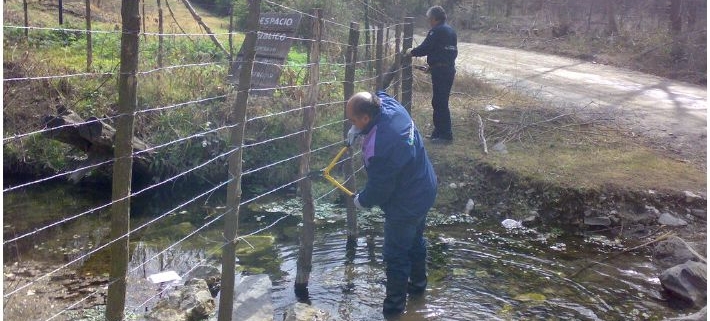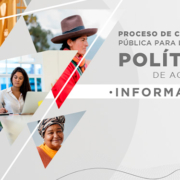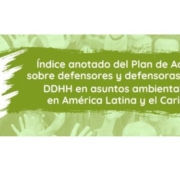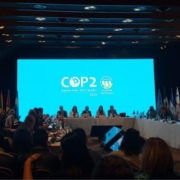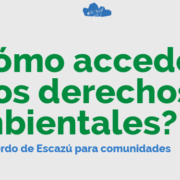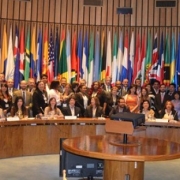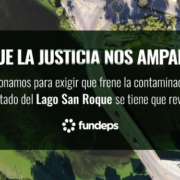Drinking water in Alta Gracia: we present an injunction due to lack of public information
Together with the Table for Water and the Environment of Alta Gracia we present an action for protection for default against the Provincial Administration of Water Resources, for not having responded to a request for public information that we made about the work of providing drinking water for the Country Club “El Potrerillo de Larreta”.
“Below, we offer a google translate version of the original article in Spanish. This translation may not be accurate but serves as a general presentation of the article. For more accurate information, please switch to the Spanish version of the website. In addition, feel free to directly contact in English the person mentioned at the bottom of this article with regards to this topic”.
For months, the Table for Water and the Environment of Alta Gracia (MAyA), made up of people from the community, has been trying to obtain accurate information about the aqueduct that is intended to be carried out to provide drinking water to the Country Club “El Potrerillo de “Larreta.” As has been confirmed, this aqueduct comes from the main pipe that carries water to the entire town and would be 160 millimeters, so it could supply approximately 20 thousand people but the country has only 347 lots.
Let us remember that for more than 10 years, the same country has maintained a 4-kilometer wire in the Los Paredones stream, which is the main tributary of the Chicamtoltina stream (or Alta Gracia stream), preventing community access and violating regulations that establish the right to the common use of terrestrial waters.
The concern for the construction and subsequent operation of this aqueduct lies in the fact that currently the master pipe provides water to the entire community of Alta Gracia and other towns such as Falda del Carmen and Villa del Prado, which at different times of the year suffer from serious problems. of supply. Therefore, if this connection work to the main pipe is carried out, the problem will increase in the future, causing part of the citizenry to have access to drinking water while another large portion does not. Which would imply the violation of a fundamental human right.
Now, given this situation, the Roundtable for Water and the Environment presented various requests for access to public information to the different departments that would be involved in the development of the work. The Municipality and the Alta Gracia Sanitary Works Cooperative responded to the requests made. They said that they were only aware that in 2018 they submitted a request for authorization to use public roads for the construction of a work that sought to provide water to Potrerillo De Larreta. They also stated that in 2021 authorization was requested to begin the work, giving rise to inspections carried out by the Ministry of Public Works and Planning.
They also made a request for information about this work to the Provincial Administration of Water Resources (APRHI), the department that exercises ownership of the water resources of the province. Given the lack of response, from Fundeps and the neighborhood community, we presented an injunction for late delivery of the requested information.
What is a default protection? What did the Provincial Water Resources Administration respond?
An amparo for delay is a judicial action whose sole purpose is to obtain, through the Judicial Branch, information that has not been previously provided.
Once the action was presented, the 2nd Nomination Administrative Litigation Chamber, ordered the Provincial Administration of Water Resources to provide the information that had been requested. Only on September 6, 2023 did it respond stating that, in 2014, the then Secretariat of Water Resources of the Province had granted the technical visa to carry out the construction of the aqueduct. This project plans to supply the Potrerillo de Larreta country with a supply of 1,000 liters per connection and in 2017 a technical visa was given to a purification plant.
Denial of Environmental Democracy
Given the lack of reliable information in this regard, first of all we must say that the right to access public information in a complete and truthful manner has been systematically violated. Nor did the Public Administration fulfill the duty of, if it does not have the information requested, to redirect the request to the competent body. Likewise, it is highly questionable that it was necessary to resort to justice to obtain information since this causes jurisdictional wear and tear, and consumes time and resources that limit access to the right to information.
The right to request and access public information is guaranteed in various regulations:
-The Provincial Constitution.
-Provincial Law No. 8803 on Access to Knowledge of State Acts.
-Law 10208 on Environmental Policy of the Province of Córdoba, Law No. 25,831 on the Regime of Free Access to Public Environmental Information, Law No. 25,675 General on the Environment.
-Law No. 27566 by which Argentina approves the Regional Agreement on Access to Information, Public Participation and Access to Justice in Environmental Matters in Latin America and the Caribbean (Escazú Agreement).
In short, the conduct of the different organizations involved implies a serious denial of citizens’ rights that must be corrected since accessing public information allows one to know and participate in all political, governmental and administrative processes where the environment is compromised.
Author
Ananda Lavayén
Contact
Laura Carrizo, lauracarrizo@fundeps.org
*Photo taken from the Facebook account “Mesa por el Agua y el Ambiente de Alta Gracia”

